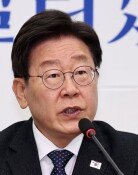[Editorial] More Pay for Full-time Unionists?
[Editorial] More Pay for Full-time Unionists?
Posted December. 15, 2009 09:32,
The Federation of Korea Trade Unions has asked for a change in a revised bill on unions by the ruling Grand National Party. The federation wants full-time union officials to get paid for their work. Under the bill, such officials cannot receive a salary from July next year but can get wages under a time-off system for doing general work such as collective bargaining. The labor umbrella group also wants pay for union activities for everything else. It seeks expansion of the scope for pay to the activities of overarching groups and education and punitive clauses in case of violation of the time-off system.
If that is the case, the principle of no pay for full-time union officials that labor, management and the government have agreed on not only becomes meaningless but moves in the wrong direction. Labor law says full-time union officials cannot receive a salary from employers, but implementation of this has been delayed yet again. The federations request is no different from legislation requiring employers to pay full-time union workers even for the hours they prepared for strikes and training workers for it.
The federation asked to exclude trade unions from the streamlining process of multiple unions, which was supposed to take place over a 30-month grace period. It said an individual unions right to strike must be guaranteed. If these suggestions are accepted, businesses will be plagued by multiple rounds of collective bargaining and frequent strikes.
The ruling Grand National Party violated the initial tripartite agreement by including a clause on general labor management work for the planned time-off system in the revised bill. The federation is attempting to cross the line. Though the party cannot ignore the federation because of its policy alliance, this is no different from giving up modernizing relations between labor and management for political interest. In most developed economies, unions have a principle of financing all the costs for their management, including pay for full-timers. In the U.S., a union is fined up to 10,000 U.S. dollars if it receives money from an employer. In France, a union gets paid for 10-20 hours per month only depending on the number of employees.
The Korean Economic Institute conducted a study that found that more full-time union officials lead to more strikes. In other words, such staff is likely to focus on conflict to maintain their pay-for-no-work status, which is a form of labor aristocracy. Labor Minister Yim Tae-hee said last week, The hours spent on political struggle by full-time union officials are not subject to government assistance for union activities. The notoriousness of Koreas militant unions impairs the nations image. Without union reform, the fundamentals of Korean business and economy cannot develop and will hinder the countrys road to further overall development.







